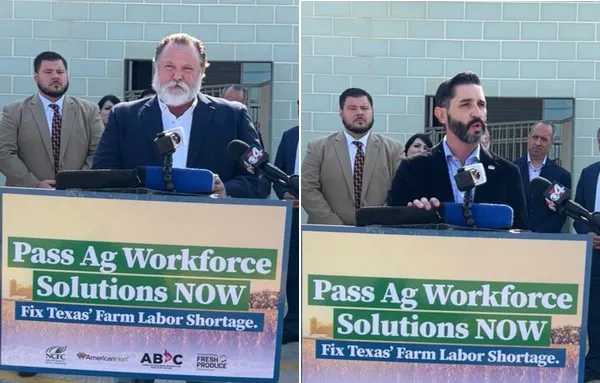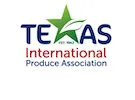“We’re fighting to stay alive.” These are the words of Bret Erickson, senior vice-president of business affairs for Little Bear Produce based in Edinburgh, Texas at yesterday’s press conference: “Lower Food Prices, Keep Shelves Stocked: Common Sense Solutions to Texas’ Farm Labor Shortage.”
In 2021, the U.S. House of Representatives passed the Farm Workforce Modernization Act with bipartisan support. Now in the Senate, Senators Mike Crapo (R-ID) and Mike Bennet (D-CO) are working on negotiating improvements on the House's solutions. Yesterday’s contingency noted that passing new Senate legislation is critical to solving labor shortages facing the Texas agriculture sector and sustaining the state’s economy as a whole.
Erickson gave an impassioned plea for help in fixing the nation’s farm labor shortage. As he notes, a few years ago Little Bear was forced to begin using the H-2A Temporary Agricultural Workers program to help supplement the dwindling workforce. “It was not done by choice. It was done out of necessity,” he said. “They’ve proven to be one of the most reliable sources of labor we can get. However, it comes at a tremendous expense--nearly 40 percent more costly than local labor. This is a fact for fruit and vegetable producers across America. Most are now using H-2A which is incredibly expensive and the program is very cumbersome.”
 Left: Bret Erickson; right: Dante Galeazzi
Left: Bret Erickson; right: Dante Galeazzi
Effects of the pandemic
As he notes, the lack of labor problem has been going on for decades though the pandemic has exacerbated the issue. “We are forced to cut back our acreage in Texas because we cannot get enough people,” said Erickson. “And going entirely to an H-2A program is financially unsustainable as it currently stands. This is in large part due to Congress’ unwillingness to help secure ag labor which would, in turn, benefit U.S. consumers through lower prices.”
At the same time, U.S. production of produce has shifted. “Nearly 50 percent of all fruits and vegetables consumed here are now imported. The security of our nation’s produce supply has quietly tilted in the favor of other countries,” said Erickson. “There’s a direct correlation to the shift and the fact that congress has done nothing for ag labor reforms in over a generation.”
Dante Galeazzi, president and CEO, Texas International Produce Association noted he was there representing the 6,000 family farms in Texas. He implored much of the same from elected officials and also raised concerns over where produce is coming from. “The U.S. Department of Agriculture predicts that next year, the U.S. will be a net importer of agricultural goods, meaning we will rely more heavily on imports from other countries to put food on our tables,” added Juan Carlos Cerda, state director, Texas & deputy campaign director of the American Business Immigration Coalition (ABIC). “We don’t want to create trade imbalances and we don’t want to rely completely on other countries to grow our food.”
Offsetting increasing food prices
Galeazzi also raised an issue growers and shippers across the country are all too familiar with: increasing costs. “Our produce companies are citing a 22-23 percent increase in overhead expenses just to operate. Food prices for fruits and vegetables have only gone up 10-11 percent,” he said. “If nothing else changes from today, we still have 12-13 percent more increases to go just to cover inflation. Labor will go up even further as we continue to compete and that means food prices will go even higher as we face what is going to be three to five years of inflation.”
The group as a whole connected the dots between labor concerns, inflation and today’s escalating food costs. “Food prices are climbing in the face of a multi-year projected inflationary period. Our officials can help or at least limit some of those increases by addressing an issue that has been longstanding in this country,” said Galezzi.
Erickson didn’t mince words when it came to his conclusions about what is needed. “Our officials in D.C. have kicked the ag labor can issue down the road for far too long. U.S. consumers are paying the price and so are farmers,” he said. “We’re being put out of business.”
The conference was hosted at Little Bear's facilities by the American Business Immigration Coalition Action (ABIC Action) and participants included Dante Galeazzi, president and CEO, Texas International Produce Association; Gerry Garcia, vice-president of special projects and government affairs, McAllen Chamber of Commerce; mayor Javier Villalobos, City of McAllen; mayor Ramiro Garza, City of Edinburg; Juan Carlos Cerda, Texas state director and deputy campaign director, ABIC - Action.
 For more information:
For more information:
Bret Erickson
Little Bear Produce
Tel: +1 (956) 380-0353
berickson@littlebearproduce.com
www.littlebearproduce.com
 Hector Garza
Hector Garza
Texas International Produce Association
Tel: +1 (956) 581-8632
hector.garza@texipa.org
https://texipa.org/
